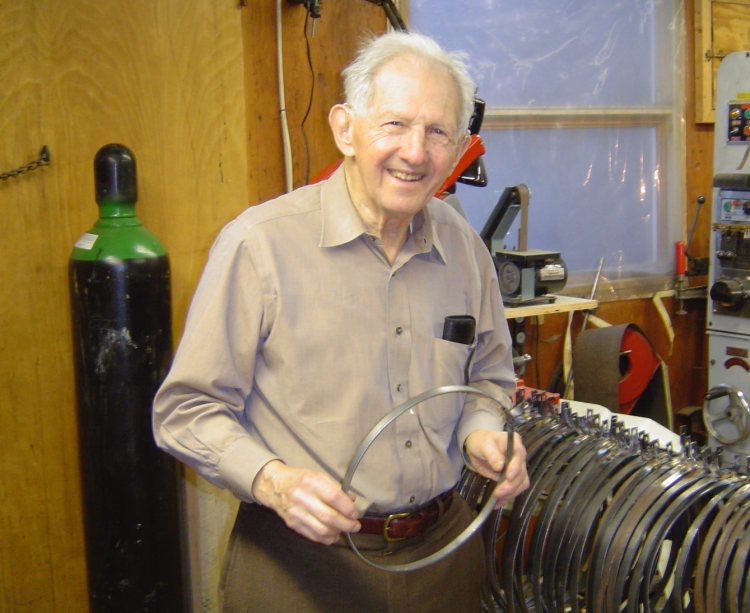Like his wife, who died three years ago, Irving Isaacson did what he knew to be right regardless of how difficult the task might be and rarely worried about the uncertain future that lies before all of us.
“I was so blessed to have both of my parents. They were both fearless and I think it was the war that taught both of them that,” said Isaacson’s son Mark Isaacson of Cumberland, referring to World War II.
“They didn’t worry about tomorrow or what was going to happen in the future.”
Family members said that Irving Isaacson died at Hospice House in Auburn on Wednesday. The Auburn native and well-known lawyer, whose practice was based in Lewiston, was 102.
His law firm, Brann and Isaacson, still carries on today, a practice that he actively participated in until he finally retired at the age of 95.
Isaacson’s wife, Judith Magyar Isaacson, died in 2015 at the age of 90.
She was a Holocaust survivor, an advocate for women’s education, a teacher and a memoirist.

Judith and Irving Isaacson. When asked how long they were married, he always answered, “Not long enough.”
The couple first met in Leipzig, Germany, which had been destroyed in 1945. At the time, Isaacson was serving in the Army as an intelligence officer for the Office of Strategic Services, or OSS – the wartime predecessor of the CIA.
Jutka (Judith) Magyar was a survivor of the Auschwitz concentration camp in Poland as well as the slave labor camp in Hessisch-Lichtenau, Germany, where people were forced to work in an underground munitions factory.
After being liberated by American troops in 1945, she was waiting to be transported back to her native Hungary when she met Isaacson.
He fell in love with her on the spot.
“She was tall and beautiful. He was short, rugged and cute,” his family wrote in his obituary. “They were married in the bombed out Nuremberg City Hall on Dec. 24, 1945. They were married and had three children.
“When asked how long they were married, he always answered, Not long enough.”
Isaacson was born at his parents’ home in Auburn on Aug. 7, 1915.

Irving Isaacson was a risk-taker – creative and daring – and had little tolerance for pretentious people, his daughter, Ilona Bell, says.
He graduated from the “brand new” Lewiston High School in 1932, from Bates College with a degree in economics in 1936, and from Harvard Law School in 1939.
After practicing law for about a year, he decided to enlist in the National Guard.
It wasn’t long before he got dragged into World War II and was assigned to England as a replacement officer for D-Day casualties.
“I think he expected to die in the war, but he didn’t,” his son said Sunday.
Instead, Maj. Isaacson got unexpected orders, which he thought were in error – to report to the English headquarters of the OSS. After being trained to parachute behind enemy lines, he was sent to Holland to help with the Dutch resistance effort.
“He loved serving in the OSS,” his son said in a telephone interview. “The adventure, the lack of rules, and the freedom to do as you please were all appealing.”
After World War II ended, he moved on his own initiative to Eastern Germany and began spying on the Soviets with assistance from a staff sergeant named Fred Switgall.
Mark Isaacson said Switgall was fluent in several languages, including Russian.
The war buddies roamed Eastern Europe, drinking vodka and gathering information on Soviet troop movements while “hobnobbing” with Russian officers.
Isaacson wrote a book about his experiences.
In “Memoirs of an Amateur Spy,” he described himself as the first Cold War spy.
His reports on the Russian troop movements and activity in Europe made it to the desk of President Harry S. Truman.
Isaacson’s daughter, Ilona Bell of Williamstown, Massachusetts, asked her father when he turned 100 what he attributed his long life to.
Bell said he told her that there were three things he felt contributed to his longevity – he never worried, he never complained and he lifted weights.
“He was short in stature, but very strong,” Bell said.
Bell said her father was a risk-taker – he was creative, daring and had little tolerance for pretentious people.
“He was not at all interested in conventional wisdom,” she said.
“He did what he thought was necessary and what was right. He was a very principled person.”
After the war, Isaacson returned to Lewiston, where he joined his father, Peter Isaacson, in the Brann and Isaacson law firm. During his law career, he served as legal counsel to the emerging Maine chicken and egg industry and to Freeport-based retailer L.L. Bean.
Isaacson practiced commercial and corporate law for 65 years.
Isaacson was also a talented metalworker and blacksmith for nearly all his adult life.
He stopped blacksmithing at age 95 when hammering hot metal became too hazardous.
In addition to his son Mark Isaacson and daughter Ilona Bell, he is survived by another son, John Isaacson; a sister; and several grandchildren and great-grandchildren.
Services will be held at 11 a.m. Monday at the Temple Shalom Synagogue in Auburn.
Send questions/comments to the editors.



